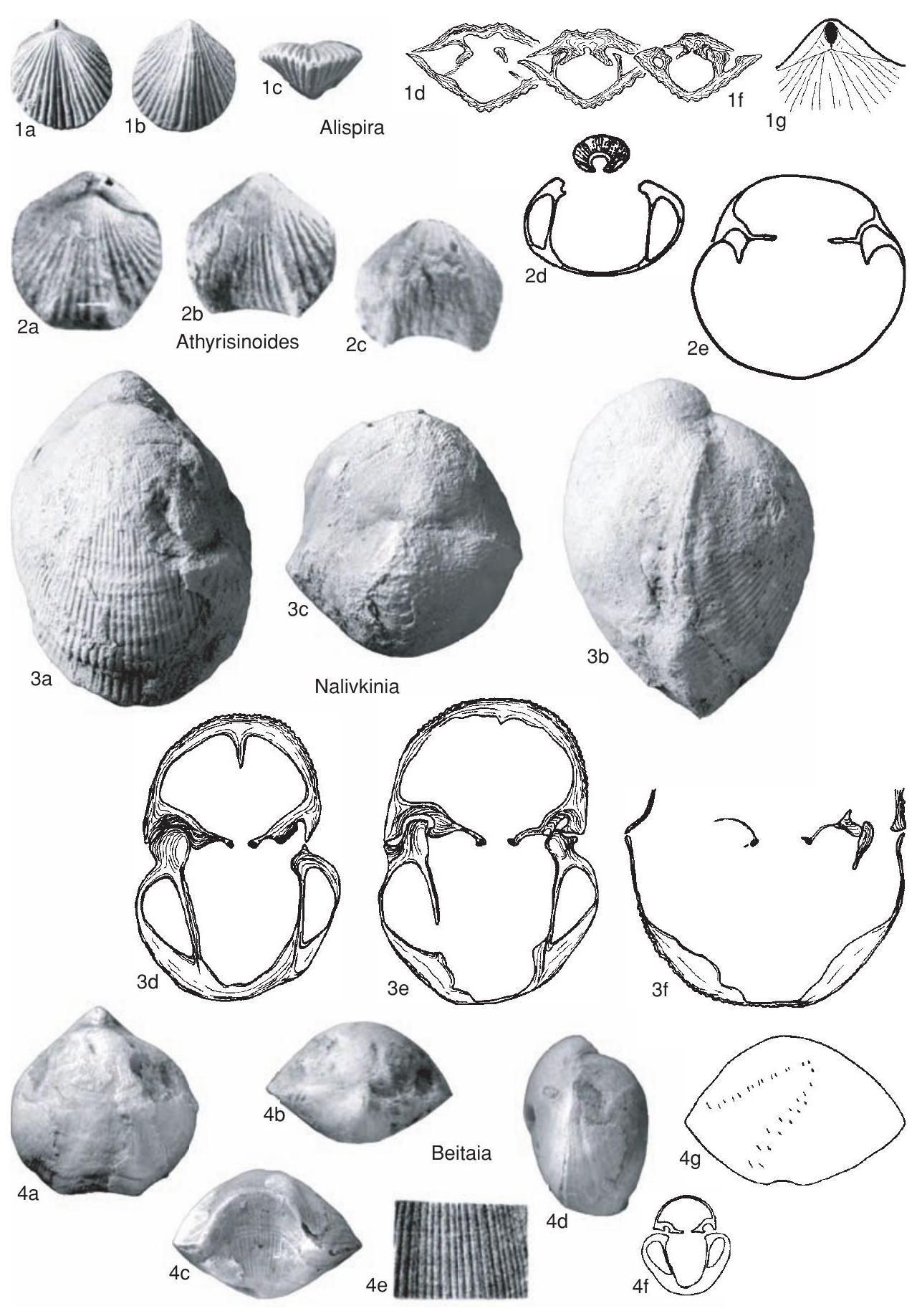Welcome to the Treatise on Invertebrate Paleontology!
Please enter a genera name to retrieve more information.

Nalivkinia
Classification
Phylum:
Brachiopoda
Subphylum:
Rhynchonelliformea
Class:
Rhynchonellata
Order:
Atrypida
Suborder:
Atrypidina
Superfamily:
Atrypoidea
Family:
Atrypinidae
Subfamily:
Clintonellinae
Formal Genus Name and Reference:
Nalivkinia BUBLICHENKO, 1927, p. 982
Type Species:
Atrypa gruenewaldtiaeformis von PEETZ, 1901, p. 147, OD
Images
(Click to enlarge in a new window)
Fig. 965, 3a-f. *N. gruenewaldtiaeformis (von Peetz), Wenlock, Kuznetsk basin, a-c, dorsal, lateral, posterior views, x2, d-f, serial sections, x5 (Copper, 1977a).
Synonyms
Geographic Distribution
southern Siberia, Altai
Age Range
Beginning Stage in Treatise Usage:
Silurian (upper Llandovery)
Beginning International Stage:
Telychian
Fraction Up In Beginning Stage:
0
Beginning Date:
438.59
Ending Stage in Treatise Usage:
Silurian (Ludlow)
Ending International Stage:
Ludfordian
Fraction Up In Ending Stage:
100
Ending Date:
422.73
Description
Medium to large, globose, strongly biconvex; small, hypercline area; foramen transapical or obscured, absent; deltidial plates absent in adult shell; ribs fine; abundant, very short, growth lamellae or growth interruptions; commissure rectimarginate to weakly plicate; interior with large dental cavities; short, dorsoventrally oriented teeth; delicate socket plates; small bushy crura; spiralia dorsomedial, fewer than 6 whorls, jugal processes straight, nearly touching. [Distinguished from other clintonellinids by large size, incurved beak, presence of short concentric growth lamellae, distinguished from Tibetatrypa by large dental cavities, thinner shell, delicate socket plates, absence of strong anterior fold.]
References
Museum or Author Information
Classification
Phylum:
Brachiopoda
Subphylum:
Rhynchonelliformea
Class:
Rhynchonellata
Order:
Atrypida
Suborder:
Atrypidina
Superfamily:
Atrypoidea
Family:
Atrypinidae
Subfamily:
Clintonellinae
Formal Genus Name and Reference:
Nalivkinia BUBLICHENKO, 1927, p. 982
Type Species:
Atrypa gruenewaldtiaeformis von PEETZ, 1901, p. 147, OD
Images
(Click to enlarge in a new window)
Fig. 965, 3a-f. *N. gruenewaldtiaeformis (von Peetz), Wenlock, Kuznetsk basin, a-c, dorsal, lateral, posterior views, x2, d-f, serial sections, x5 (Copper, 1977a).
Synonyms
Geographic Distribution
southern Siberia, Altai
Age Range
Beginning Stage in Treatise Usage:
Silurian (upper Llandovery)
Beginning International Stage:
Telychian
Fraction Up In Beginning Stage:
0
Beginning Date:
438.59
Ending Stage in Treatise Usage:
Silurian (Ludlow)
Ending International Stage:
Ludfordian
Fraction Up In Ending Stage:
100
Ending Date:
422.73
Description
Medium to large, globose, strongly biconvex; small, hypercline area; foramen transapical or obscured, absent; deltidial plates absent in adult shell; ribs fine; abundant, very short, growth lamellae or growth interruptions; commissure rectimarginate to weakly plicate; interior with large dental cavities; short, dorsoventrally oriented teeth; delicate socket plates; small bushy crura; spiralia dorsomedial, fewer than 6 whorls, jugal processes straight, nearly touching. [Distinguished from other clintonellinids by large size, incurved beak, presence of short concentric growth lamellae, distinguished from Tibetatrypa by large dental cavities, thinner shell, delicate socket plates, absence of strong anterior fold.]
